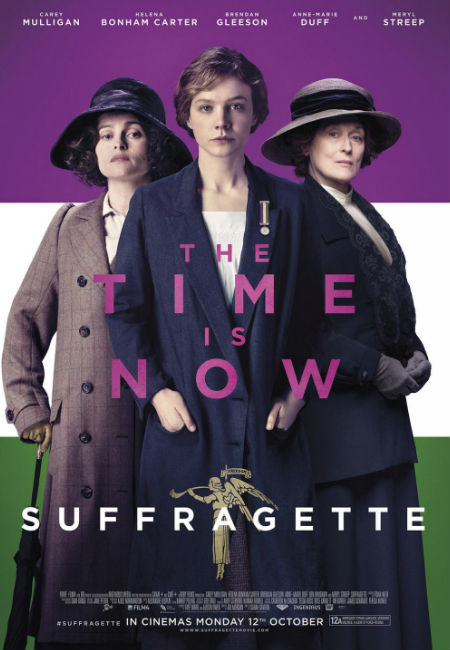
Humanity, by and large, has a very short memory.
In no time at all, rights won with blood, sweat and tears, and a wilful and necessary disregard of the established order, are seen as near ubiquitous and entirely natural.
While that is good in one sense, and reflects how things can change and be accepted in a relatively short period of time if a small group of brave people will do what’s necessary to bring this change into being, it also means that a true appreciation of what it took to bring these rights into the mainstream and how miraculous their acceptance is can be lost.
Which is why films like the Sarah Gavron-directed, Abi Morgan-penned Suffragette are so vitally important since they remind that democracy, the universal vote, workers’ rights and a host of other social and political advances didn’t just materialise into being.
Rather they came about as the result of people deciding that life could be more than what it is, that the way things were, and had often been for centuries, did not necessarily have to be how they would always be.
It was that kind of visionary outlook that powered people like 24 year old laundress Maud Watts (Carey Mulligan in a powerfully affecting performance) to sacrifice a great deal – in her case, her son, husband and a job she had held since she was 7 – in pursuit of the kind of change that seemed all but inevitable.
Not to everyone, of course.
Maud, a fictional everywoman protagonist, her fellow fictional woman-at-arms Edith Ellyn (Helena Bonham Carter), and her actual historically-recognised suffragettes such as the leader of the early-20th century suffragette movement for women’s voting rights, Emmeline Pankhurst (Meryl Streep in a blink-and-you’ll-miss it role) and Emily Davison (Natalie Press), faced formidable opposition from a sclerotic, male-dominated ruling order who saw investing women with the right to vote, be voted into parliament etc as one of the leading horsewomen of the social apocalypse.
And they employed everything in their arsenal to stop them, arresting, imprisoning and routinely harassing the suffragette protestors, all but branding them terrorists, in a vain attempt to stop the inevitable.
Well, what we regard as the inevitable anyway.
As Suffragette demonstrates, a little too undramatically and tick-the-boxes at times, there was nothing inevitable about the push for women’s rights at all, and only the sheer dedication of a small group of protestors who increasingly took to violent though non-lethal means such as breaking windows with stones and blowing up red postal boxes to get some exposure for their against-the-odds campaign.
Mulligan’s Watt is the bleeding heart of Suffragette‘s tale, giving the film a great deal more emotional and dramatic resonance than it might otherwise have.
Beginning as a woman who simply accepted that working from the age of 7 in a laundry into which she had been literally born, working for a lesser wage than the delivery men around her and for longer hours, and being sexually exploited by the owner was the way things were, and likely, would always be.
But within days of meeting fellow laundress and passionate revolutionary Violet Miller (Anne-Marie Duff), she becomes involved step-by-step in the suffragette movement, increasingly realising that life could be the more than the exploitatively small and rights-less world in which she lived, one in which not even her rights as a mother were recognised.
She does not seek to lose everything dear to her of course – the loss of her husband, who does not support her newly-emerged and increasingly articulated new views, her son and her job, and thus everything that had defined her up to that point, fell off one by one as the powerful political and legal apparatus around her swung into action, determined to stop her and her fellow suffragettes from achieving their aims.
The loss of her old life in pursuit of the new lends a deeply-moving resonance to her struggle, and that of the movement as a whole, graphically underscoring that these women gave up a great deal to bring about rights that are seen as part of the natural order of things now.
While the film itself doesn’t exactly set the world on fire in a narrative sense, moving from one chronological event to the next, one increasingly desperate measure to another as the women and their occasional male allies, did everything they could to garner publicity for their cause, it is Mulligan’s performance that brings home how had to be sacrificed to change the world.
This was not the idle struggle of people who slipped out every second Saturday for a spot of placard-waving and slogan-shouting; rather these women gave up their all often and in Maud Watts we come to understand and deeply appreciate how much of a sacrifice it was.
If all Suffragette accomplishes, which is an engrossing, all-consuming tale thanks to Mulligan’s presence, and to a lesser extent Bonham-Carter’s, is to remind us that the rights and freedoms we all enjoy have often been the result of this kind of do-or-die mentality then it will have well-and-truly justified its existence.
But more than that, it is a powerful demonstration of the tenacity and passion of the human spirit, and our collective willingness, even if only a small number initially rally to the banner, to make a profound difference in society and change the world for the better for generations to come.